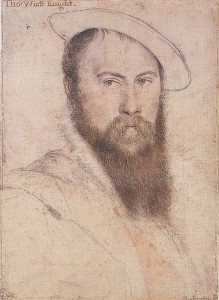
By 5th May 1536, two further arrests had taken place: courtier, poet and diplomat Sir Thomas Wyatt, and Sir Richard Page, a Gentleman of the Privy Chamber.
Neither man was named in the indictments of May 1536 and they were subsequently released. You can find out more about Page in my article Sir Richard Page and Sir Francis Bryan, but he was a member of the privy chamber, a close friend of Anne’s and a man she had rewarded for carrying out “sundry little services”.1 Wyatt was, of course, a man who had been linked romantically with Anne before her relationship with the King – see Circa Regna Tonat – About the Throne the Thunder Rolls for more information.
Wyatt witnessed the executions of Rochford, Norris, Brereton, Weston and Smeaton from his prison in the Bell Tower and recorded his feelings in two poems, “In Mourning Wise Since Daily I Increase” and “V. Innocentia Veritas Viat Fides Circumdederunt me inimici mei”. You can read the poems at Execution Poetry.
I find it interesting that Wyatt survived Anne’s fall. In my opinion, he would have been the perfect fall guy as it would have been easy for Cromwell or the King to frame him for adultery or to claim that Anne had not been a virgin when she married the King because of a relationship with Wyatt. Surely it would have been easier to link Wyatt to Anne than linking Norris, Smeaton, Weston or Brereton to her. It appears that Wyatt was saved by the fact that he had distanced himself from Anne since her marriage and also by his father’s close relationship with Cromwell.2
Also around 5th May 1536, Sir Francis Bryan, a man ‘christened’ the “Vicar of Hell”3 by Thomas Cromwell, was ordered to London for questioning. Bryan was questioned but not arrested. He had once benefited from Anne Boleyn’s patronage and their family connection, but he was best friends with Sir Nicholas Carew and had changed to the sides of the Seymours. Was Bryan’s arrest, as Alison Weir puts it, “a charade to lend credibility to the other arrests”?4 Perhaps so. He certainly did not suffer from this ‘blip’ in his career and was chosen by the King on 19th May 1536 to inform Jane Seymour of Anne’s execution.
Notes and Sources
- Friedmann, Paul. Anne Boleyn. Amberley, 2010, p235
- We have records of Sir Henry Wyatt’s letters to Cromwell regarding his son’s imprisonment – LP x. 840 and 1131
- LP x. 873
- Weir, Alison. Henry VIII: The King and His Court, Kindle edition